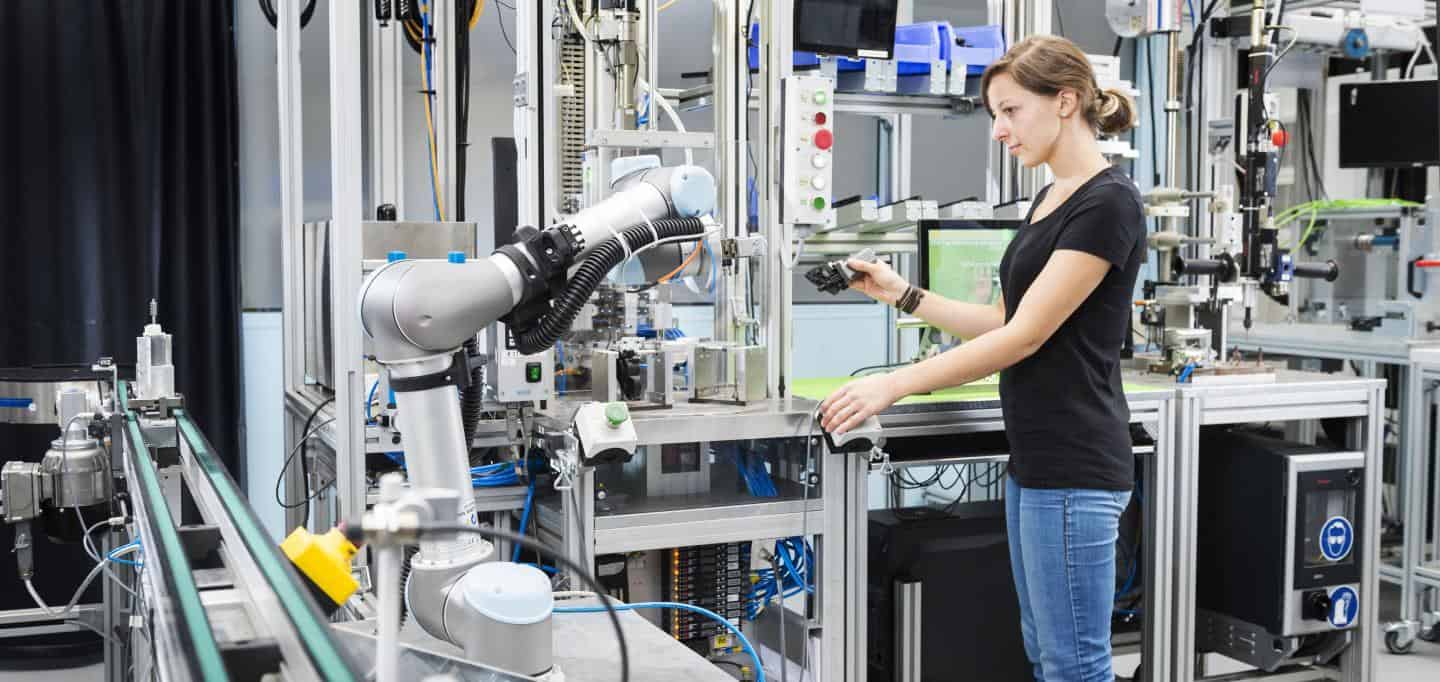Photo: Sandra Goettisheim, KIT
Manufacturing Engineers design, implement and optimise (non-chemical or non-biochemical) manufacturing systems, particularly machining and assembly processes to turn individual parts, sub-assemblies, and raw materials into finished distinct products (cars, phones, TVs, computers, machine tools, etc). Manufacturing engineers are typically trained in manufacturing, production or industrial engineering.
According to the BLS, the median annual wage for industrial/manufacturing engineers was $99,380 in May 2023 with projected job growth of 12% from 2022-2032 (Much faster than average).
Median level salaries after 5 years of experience range from €70,000 – €80,000 plus overtime, bonuses and allowances. (Irish Salary Calculator)
Manufacturing Engineer Vs. Process Engineer
There seems to be a lot of confusion between Manufacturing Engineers and Process Engineers. In summary:
Manufacturing Engineers (generally) work in Discrete Manufacturing – machines and assemble (screws, bolts, welds, glues, rivets) individual pieces and sub-assemblies into a finished distinct product often on an assembly line.
Think car assembly – Toyota or Ford’s production line for cars, furniture manufacturing (IKEA), cell phones (iPhones), engines, electric motors, gears, ball bearings, turbine blades, tanks, computers, washing machines, TVs, airplanes, syringes, medical pumps, scalpels, pacemakers, etc.
In a discrete manufacturing factory, you typically find, assembly lines, U-shaped assembly areas, conveyor belts, machine tools, CNC machine centers, CNC lathes, stamping presses and dies, robots, welders, pick and place (SCARA) robots, injection moulding machines, packing machines, air-powered assembly tools, painting and finishing areas, etc.
Process Engineers are “Chemical Engineers” who work in Process or Continuous Manufacturing – takes a formulation or recipe of ingredients and blends them together using a chemical reaction, heat, cold, fermentation, etc continuously or in a batch into a final product which is usually a liquid, powder, gas or solid.
Think turning milk into baby formula, oil refining, gasoline, plastic, shampoo, washing powder, toothpaste, casein, cheese, butter, beer, wine, whiskey, paint, drug or vaccine manufacturing, etc.
In a process manufacturing factory, you typically find, piping, pumps, tanks, flow valves, steam valves, temperature gauges, boilers, vessels, reactor vessels, crackers, distillation columns, heat exchangers, boilers, steam pipes, autoclaves, clarifiers, decanters, fluidised dryers, Program Logic Controllers (PLCs) PID (Proportional Integral Derivative) Controllers, etc,
In summary, if what you are making involves, cutting metal and welding or bolting something together like a washing machine, it’s probably manufacturing engineering. If it needs chemistry like making washing powder, it’s process or chemical engineering.
What Does a Manufacturing Engineer do?
Manufacturing Engineers use (non-chemical or non-biochemical) processes such as:
- machining – milling, turning (on a lathe), cutting (laser, plasma, abrasive water jet), grinding. electrical discharge machining (EDM)
- assembling (by hand or robot) – bolting, screwing, welding, (MIG, TIG, spot, friction), soldering, glueing, riveting
- injection moulding, 3D printing
- melting, casting, extruding, rolling, forging
- machine pressing, stamping, shearing, punching, folding, drawing (for making wire)
- precision measurement – using micrometres, vernier callipers, slip gauges, dial gauges, coordinate-measuring machines, etc
- heat treatment (to alter the properties of the material) – annealing, normalising. hardening, tempering, carburisation, etc
They use these processes to turn materials or individual parts into a final product often on an assembly line. They are responsible for ensuring that this is carried out in the most time-efficient and cost-effective way while still maintaining overall product quality.
They choose the best technologies and processes to manufacture it, plan and design the factory that will produce the product, and manage the running, maintenance, and continuous improvement of the manufacturing process. They may also be responsible for inventory control, quality management, quality control, material flow, cost analysis, procurement and supply chain management.
For a new factory or product, they would figure out the optimal manufacturing process, break out the individual process steps, design and layout the production line, choose the machinery, design, and layout the individual workstations and develop an operational plan to ramp up production.
Within existing manufacturing set-ups, they are more likely to work in the monitoring of equipment and identifying opportunities for improvements to increase productivity while maintaining product quality.
For example, a Manufacturing Engineer might be hired to:
- Automate an engine manufacturing facility through the use of robotics, computer-integrated technology, or a flexible manufacturing system (FMS).
- Design a cell phone manufacturing process to reduce costs and improve product quality.
- Figure out the most optimal layout of machines and equipment for manufacturing cells in discrete parts manufacturing.
- Develop and implement fabrication processes for microprocessors.
- Identify the most cost-effective material handling and facility layout alternative for an aerospace manufacturing company.
- Design the tools or equipment to manufacture a product if none exists.
- Apply lean manufacturing principles to eliminate the 8 deadly wastes in the production process or apply six sigma to reduce output variation.
- Analyze the product and design a method to produce that product more efficiently
- Production management including managing production targets and inventory control
- General oversight and monitoring of machinery – including project coordination for maintenance, upgrades, and repair when needed
- Working with manufacturing staff to train on new equipment or optimization processes
- Help with troubleshooting of problems within the manufacturing process
- May have budgetary responsibilities
Check out this video from Modern Machine Shop on “Meet a Manufacturing Engineer”.
Manufacturing Engineer Vs. Production Engineer Vs. Industrial Engineer
For some people, they are broadly synonyms with far more similarities than differences. But for what it’s worth, here is a very high-level take on the differences.
Manufacturing Engineers – more concerned with the initial research design, layout and build of the manufacturing process or system.
Production Engineers and more focused on running the systems and would place more emphasis on meeting production targets, inventory control, operations management, continuous improvement and elimination of waste, quality control, and quality assurance.
Industrial Engineers similar to production engineers but much more emphasis on working with people. They look for ways to make the workers’ routines more efficient to improve production.
What Skills Do I Need?
The skills needed to be an effective Manufacturing Engineer include:
- Analytical Skills – need to be able to identify areas of low efficiency and work to provide improvements
- Lean Manufacturing Skills – must be able to identify and eliminate waste within the system
- QA and QC Skills – such as ISO 9000, Six Sigma, Lean Six Sigma, Statistical Process Control, etc
- Communication Skills – will work with manufacturing employees at all levels and need to be able to effectively explain the relevant points of equipment to each. Also needed for successful project management
- Technical Skills – must be able to work with different technology to provide a solution that produces the required result in the most efficient way possible
- Commercial Awareness – must keep the “bigger picture” in mind at all times when considering each step of the manufacturing process
- Problem Solving Skills – have to take a concept of a process and establish the equipment needed to make it happen
- Organisational Abilities – should be able to prioritise tasks, set schedules and work between different projects to achieve overall business goals
Manufacturing Engineer Salaries & Job Growth
Check out our salary guide for Manufacturing Engineers local to you.
Becoming a Manufacturing Engineer
Manufacturing Engineers will typically have a Bachelors’s degree in manufacturing, industrial or production engineering. Others may start with a mechanical engineering degree and move sideways into this role. Typical coursework focuses on:
- engineering maths
- materials technology
- machine systems
- reliability and quality
- materials technology
- electrical technology
- engineering drawing/design
- applied engineering
- applied computing
- engineering design analysis
- production technology
- lean manufacturing
- fluid power automation
- thermodynamics
- the engineering design process
- engineering design operations
- process control
- mechatronics
- manufacturing technology
- operations management
- robotics & materials handling
- differential equations
- dynamics & control
- networks & facility simulation
- computer-aided engineering (CAE)
Manufacturing Engineers Jobs in Pharmaceutical and Medical Device Manufacturing
The majority of roles for manufacturing engineers tend to be in:
- Medical device manufacturing as there is a much broader use of discrete manufacturing
- Engineering consultancies also hire manufacturing production engineers into process optimisation consultancy roles
- Pharmaceutical and biopharmaceutical manufacturing will also have roles but the majority (but not all) tend to be concentrated around fill-finishing and packaging operations (Think running a highly automated packaging line).
Pharmaceutical and Medical Device manufacturing is a regulated industry so most, manufacturing engineers are probably going to need some retraining, especially in Good Manufacturing Practices (GMPs) and risk management techniques.
So you would have roughly 2 broad options.
Option 1
Take our GMP Training for Beginners for the Pharmaceutical Industry and retrain roles in medical device manufacturing.
Option 2
Retrain for production/manufacturing roles within a GMP-regulated manufacturing environment such as a medical device or pharmaceutical manufacturing.
Take our 18-week online Conversion Course into Engineering Roles in Pharma to learn GMPs and how safe medicines and medical devices are made in a regulated environment. You will also learn the air, water and steam systems that underpin medical device manufacturing.
Manufacturing Engineer Resume Tips
As with all resumes, it’s extremely important that you tailor your Manufacturing Engineer resume to reflect the language used within the job advert. Where you have relevant experience or skills, use the words and phrases that the employer has used to describe them. Do not assume that someone will read similar wording and know what you mean.
Manufacturing Engineer roles will typically be looking for the skills previously outlined:
- Analytical Skills
- Communication Skills
- Technical Skills
- Commercial Awareness
- Problem Solving Skills
- Organizational Abilities
For more help with your resume, check out these templates and this list of 30 tips to improve your resume.
Manufacturing Engineering Job Vacancies in Pharma
For a list of currently available pharmaceutical Manufacturing Engineering roles, head over to our jobs boards and select Engineering in the “Jobs by Category” menu. We currently have job boards for Ireland and the UK.
Other Types of Pharma Job Roles
Manufacturing/Production
- Process Technician
- Process Operator
- Manufacturing Technician
- Production Operator
- Packaging Operator
- Production Supervisor
Engineering
Maintenance
Quality
Science/Laboratory
Validation
Our Most Popular Programs and Courses
- Good Manufacturing Practice (GMP) Course
- Equipment Validation Training Course – for Starter Validation, CQV and C&Q roles
- Pharmaceutical Validation Training Course – for more Senior Validation, CQV and C&Q roles
- Computer System Validation Course
- View All 13 Online Pharmaceutical Courses
About the Author
Donagh Fitzgerald
Head of Marketing & Product Development
Mechanical/Production Engineer
Donagh looks after the marketing and product development including the training and pedagogical elements of our programs and makes sure that all GetReskilled’s users can have a great online learning experience. Donagh has lived and worked in many countries including Ireland, America, the UK, Singapore, Hong Kong and Japan. Donagh has also served as the Program Manager for the Farmleigh Fellowship based out of Singapore.
Donagh holds Degrees in Production Engineering and Mechanical Engineering from South East Technological University, Ireland.
Claire Wilson
Content Marketing and Career Coaching
Claire runs GetReskilled’s Advanced Career Coaching Programme – our specially devised job hunting course that helps our trainees take that final step into employment by leading them through the job hunting process. She is extremely enthusiastic about helping people reach their final goal of employment in their new career path.
Claire has a BSc (Hons) in Medical Biology from Edinburgh University and spent 7 years working in the pharmaceutical and medical device industries.



Terrific article
Best article I have read in a LONG time. Brilliant.